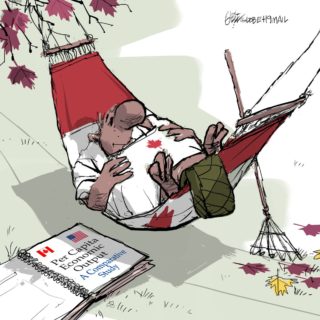Republicans, backed by pro-trade Democrats, gave U.S. President Barack Obama unfettered authority Tuesday to cut a massive Pacific Rim trade deal that may help define his otherwise scanty foreign-affairs legacy.
The development will force countries such as Canada to put their cards on the table and show what they are willing to sacrifice to join the Trans-Pacific Partnership, the biggest trade deal since NAFTA.
Armed with so-called Fast Track authority, Mr. Obama hopes to move quickly to conclude the controversial TPP trade pact with China and 10 other Pacific Rim countries.
Japan, Canada and other countries have resisted making final concessions in politically touchy areas, such as agriculture, until Congress gives Mr. Obama unfettered trade negotiating powers.
Canada has insisted it wants to be part of the sweeping TPP trade deal, which would create a free-trade zone among countries with a combined economic output of $28-trillion (U.S.). The deal would boost Canadian exports of business services and various agricultural commodities.
But the Conservative government has been coy about how much access to Canada’s heavily protected dairy and poultry industries it’s willing to give up to secure entry. Canada is facing intense pressure from the U.S., Australia and New Zealand to open its borders to much more duty-free milk, cheese and chicken.
Canada currently protects these tightly regulated sectors with prohibitive tariffs of 200 per cent to 300 per cent, while allowing in limited quantities of duty-free imports. Ottawa is set to give European countries additional duty-free access in the European free trade deal. TPP countries would likely demand more of the same – a concession that would outrage Canada’s politically powerful dairy and chicken farmers.
The U.S. Senate’s 60-37 procedural vote Tuesday ended debate and assured final passage of Fast Track on Wednesday.
Big business and their allies in Congress exulted.
U.S. Chamber of Commerce president Thomas J. Donohue hailed an “important step toward revitalizing our economy, creating more good American jobs and reasserting our country’s global economic leadership.”
Senator Mitch McConnell, the Republican Majority Leader, called it “an important moment for the country.”
But critics predicted a race to the bottom; another “giant sucking sound” as one-time presidential hopeful Ross Perot put it, as U.S. jobs are lost, environmental protections eroded and heath regulations weakened.
“We’re outraged that Congress today voted to fast-track pollution,” said May Boeve, executive director of the environmental group 350.org. “We’re so disappointed President Obama has taken up the banner for ramming this legislative pollution through the halls of Congress, in a way he never pushed for a climate bill.”
Melinda St. Louis, who heads Public Citizen’s Global Trade Watch, decried the “elaborate legislative contortions” that allowed Congress a second chance to pass Fast Track after a Democratic revolt in the House of Representatives derailed it two weeks ago. The Republican majority in the House salvaged Fast Track last week by splitting it away from a workers’ aid package.
The 12-nation Pacific trade deal “will mean more export of jobs, more downward pressure on wages, … [and] undermine our ability to maintain and adopt strong environmental and consumer protections. … [T]hese deals are designed to help giant corporations, and not communities,” Ms. St. Louis said in a statement.
After Tuesday’s vote, in which 13 of 44 Democrats and 47 of 54 Republicans voted to cut off debate, the final passage of Fast Track authority is set for Wednesday when only 51 votes are needed in the 100-seat Senate.
Another bill, intended to help workers who lose their jobs as a result of the TPP, is slated for Congressional votes later this week.
Mr. Obama has said he wants to sign both but has skirted whether he would take his much-desired Fast Track authority even if the workers’ aid bill gets blocked in Congress.
Fast Track means Mr. Obama’s trade negotiators can conclude the deal, perhaps as early as next month. Under Fast Track, an authority given several of Mr. Obama’s predecessors, Congress gives up its right to amend any trade deal and must either pass or reject the entire package.
Fast Track “will do nothing to prevent repeating the mistakes of failed trade policies that have contributed to stagnating wages, increasing inequality and the closure of more than 60,000 factories since 2000,” the American Federation of Labor and Congress of Industrial Organizations, the country’s largest federation of unions, said before the vote.
Free-traders back giving Mr. Obama fast-track authority, claiming it will ensure the United States retains its leading role in trade pacts. The TPP would involve a dozen countries on both sides of the Pacific: Australia, Brunei, Canada, Chile, Japan, Malaysia, Mexico, New Zealand, Peru, Singapore, the United States and Vietnam. Together they represent 40 per cent of global output.
PAUL KORING
WASHINGTON — The Globe and Mail
Published Tuesday, Jun. 23, 2015 12:20PM EDT
Last updated Wednesday, Jun. 24, 2015 4:56AM EDT

